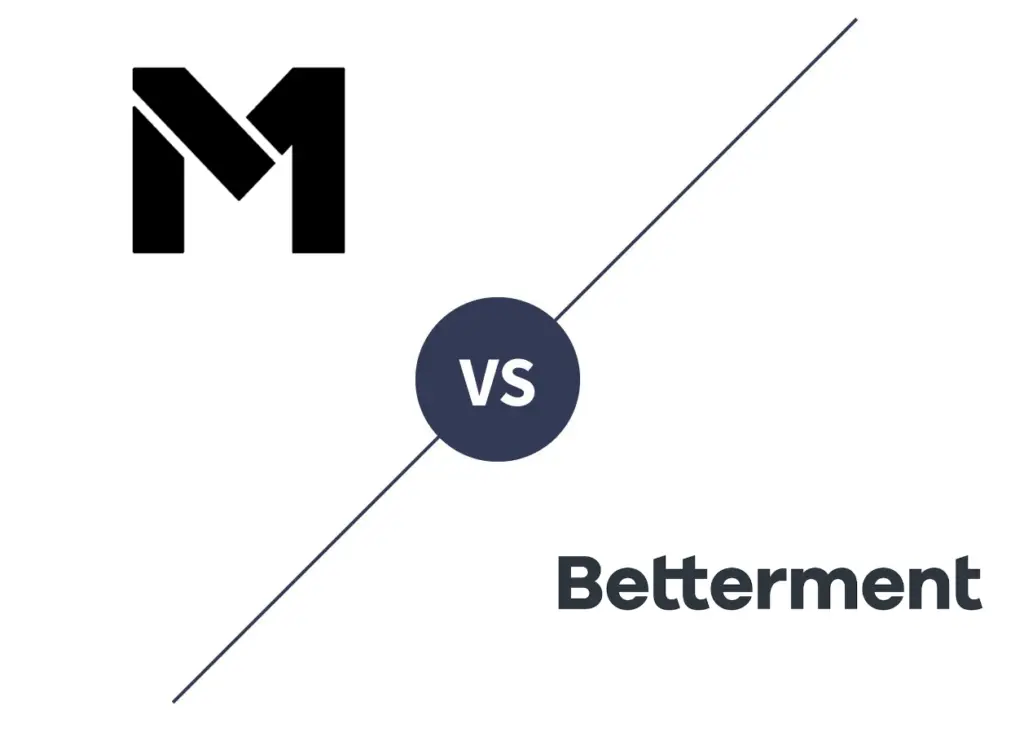
“Robo-advisors” are surging in popularity recently with low fees, convenience, and modern interfaces. Betterment is perhaps the most popular robo-advisor. Here we'll compare Betterment and M1 Finance. I wrote a separate comprehensive review of M1 Finance here if you're interested in that.
Disclosure: Some of the links on this page are referral links. At no additional cost to you, if you choose to make a purchase or sign up for a service after clicking through those links, I may receive a small commission. This allows me to continue producing high-quality, ad-free content on this site and pays for the occasional cup of coffee. I have first-hand experience with every product or service I recommend, and I recommend them because I genuinely believe they are useful, not because of the commission I get if you decide to purchase through my links. Read more here.
M1 Finance vs. Betterment – Summary Comparison
Contents
M1 Finance vs. Betterment – Commissions and Fees
M1 Finance offers fee-free investing; no account fees and zero commissions, plain and simple. There are obviously miscellaneous one-time fees for things like paper statements, outbound account transfers, inactivity, etc.
Betterment carries a 0.25% annual fee for their basic plan and a 0.40% annual fee for their Premium plan. The Premium plan includes professional investing advice and financial planning advice, and requires a minimum invested balance of $100,000.
These annual fees are based on a percentage of your invested balance, also known as assets under management (AUM). For balances above $2M, you receive a 0.10% discount, reducing the basic fee to 0.15% and the Premium fee to 0.30%.
Betterment's fees look extremely low at first glance, but let's examine how they affect a portfolio's value over time:
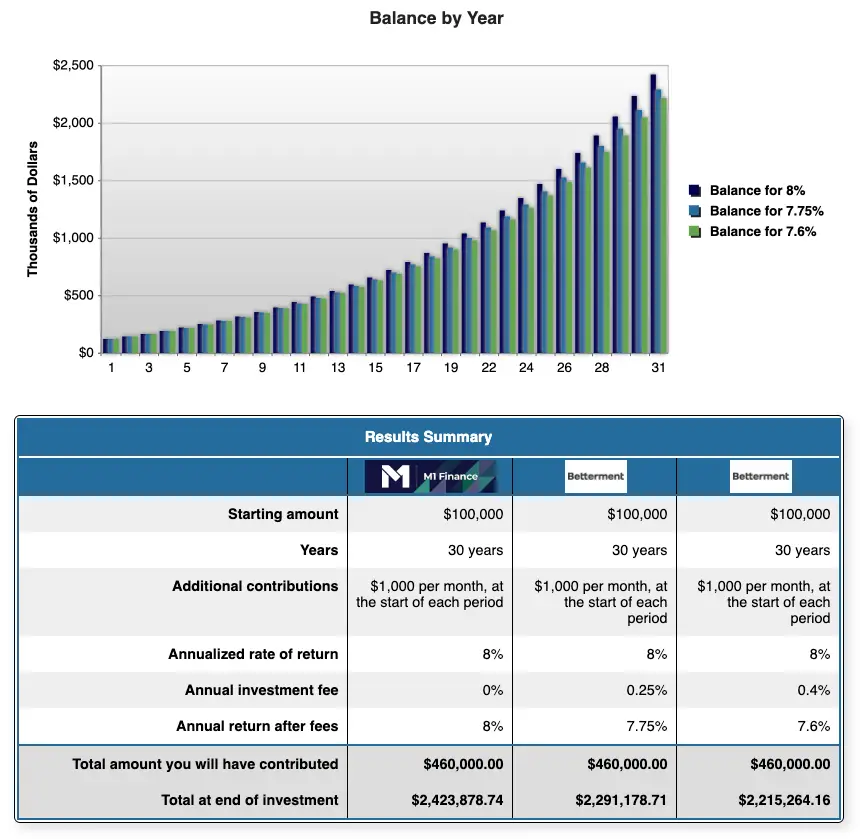
Using a starting balance of $100,000, $1,000 contributed monthly over 30 years, and an annualized rate of return of 8%, Betterment's 0.25% fee costs you $132,700 in fees. The Premium 0.40% fee costs you $208,615 in fees.
Notice how the value differences become more pronounced near the end of the investing horizon when the account value is larger. Such is the power of compound interest, in this case unfortunately working against you.
So obviously M1 wins out on fees. But what if you still want to pay for expert investing? Luckily, you can still access experts via M1's “Expert Pies” for free. More on that later.
M1 Finance vs. Betterment – Account Types
M1 Finance and Betterment offer all the same account types:
- Taxable
- Joint
- Traditional IRA
- Roth IRA
- Rollover IRA
- SEP IRA
- Trust
They currently do not offer:
- SIMPLE IRA
- Solo 401(k)
- 529
- HSA
- Non-Profit
M1 also offers Custodial accounts for premium members. Betterment does not have Custodial accounts.
It's important to note too that Betterment does not offer any type of self-directed investment account; you cannot select your own funds.
M1 Finance vs. Betterment – Investment Products
M1 Finance offers most ETF's and individual stocks traded on major exchanges.
Betterment only offers a small handful of low-cost broad index ETF's. Specifically, they only use the following indexes in your portfolio:
- U.S. Total Stock Market
- U.S. Large Cap Value
- U.S. Mid Cap Value
- U.S. Small Cap Value
- International Developed Markets Stocks
- International Emerging Markets Stocks
- U.S. Total Bond Market
- U.S. Municipal Bonds
- U.S. Inflation-Protected Bonds (TIPS)
- U.S. High-Yield Corporate Bonds
- U.S. Short-Term Treasury Bonds
- U.S. Short-Term Investment-Grade Bonds
- International Developed Markets Bonds
- International Emerging Markets Bonds
You can easily access all these on your own with M1 Finance using low-cost Vanguard funds. I also very much question the use of Value stocks without Growth stocks, the use of corporate bonds (treasury bonds are superior), and the absence of intermediate- or long-term treasury bonds.
Betterment does not offer sector ETF's or individual stocks. Also note that Betterment does not allow self-directed investment; you cannot select your own funds.
At this time, neither platform offers mutual funds, options, futures, FOREX, or crypto. They are not built for day trading.
M1 Finance vs. Betterment – Customer Service
I've seen both positives and negatives for both M1 Finance and Betterment in relation to their customer service. Both are available by phone or email 5 days a week.
M1 Finance vs. Betterment – Margin
Betterment does not offer margin loans. Margin is simply a collateralized loan on your invested securities to provide enhanced exposure for investing.
M1 Finance offers extremely cheap margin rates:
- M1 Finance – 3.50%
- M1 Plus – 2.00%
M1 Plus is a $125/year premium membership that gets you access to a 1.5% lower margin rate as shown, and a second trading window.
The margin loan from M1 Finance can be used for whatever you want – refinancing higher-interest debt, major purchases, unexpected expenses, etc.; it's just a low-interest collateralized loan.
Remember that margin is an additional risk, including the risk of losing more than you invest. Margin is not available for retirement or custodial accounts. Rates may vary.
Since Betterment offers neither margin nor leveraged ETF products, it's impossible to apply leverage to your Betterment investments.
M1 Finance vs. Betterment – Mobile App
M1 Finance and Betterment both have sleek, modern, intuitive, robust mobile apps for both Apple iOS and Android.
Here are some screenshots of the M1 app:
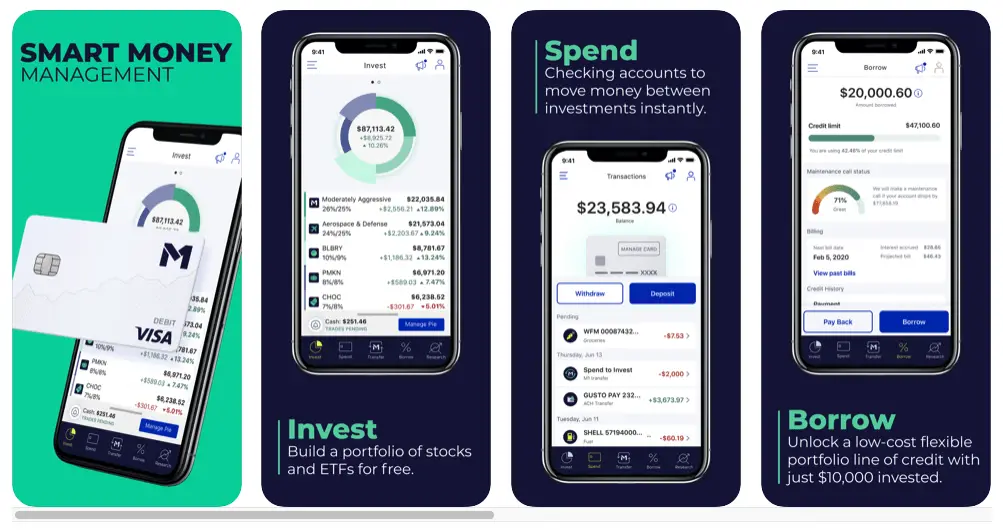
Here are some screenshots of the Betterment app:

M1 Finance vs. Betterment – Interface/Usability
Similarly, both M1 Finance and Betterment have intuitive, easy-to-use desktop interfaces.
Here's M1 with its pie-based visualization:
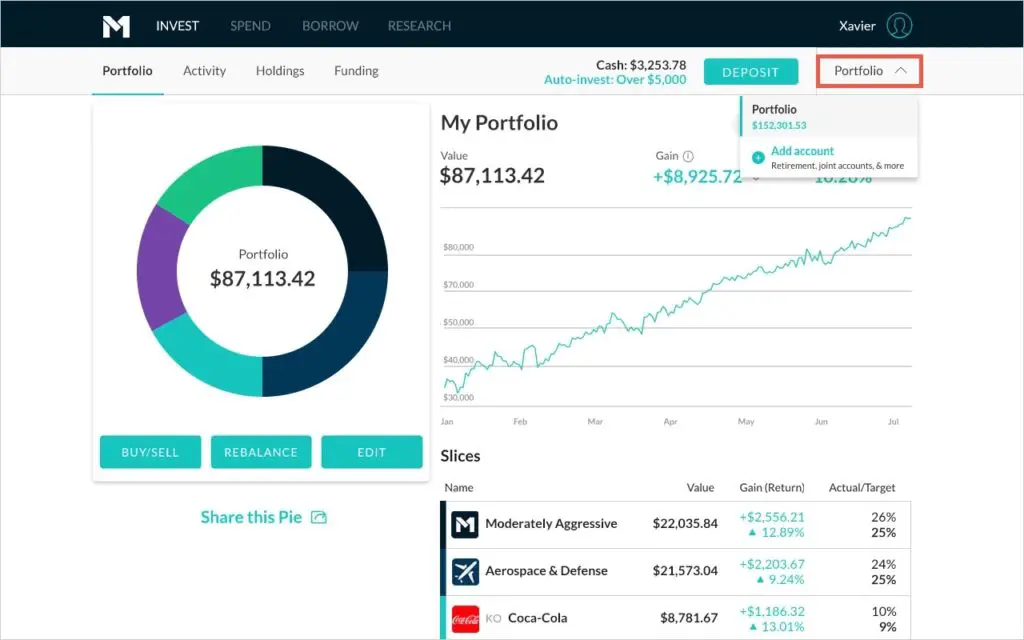
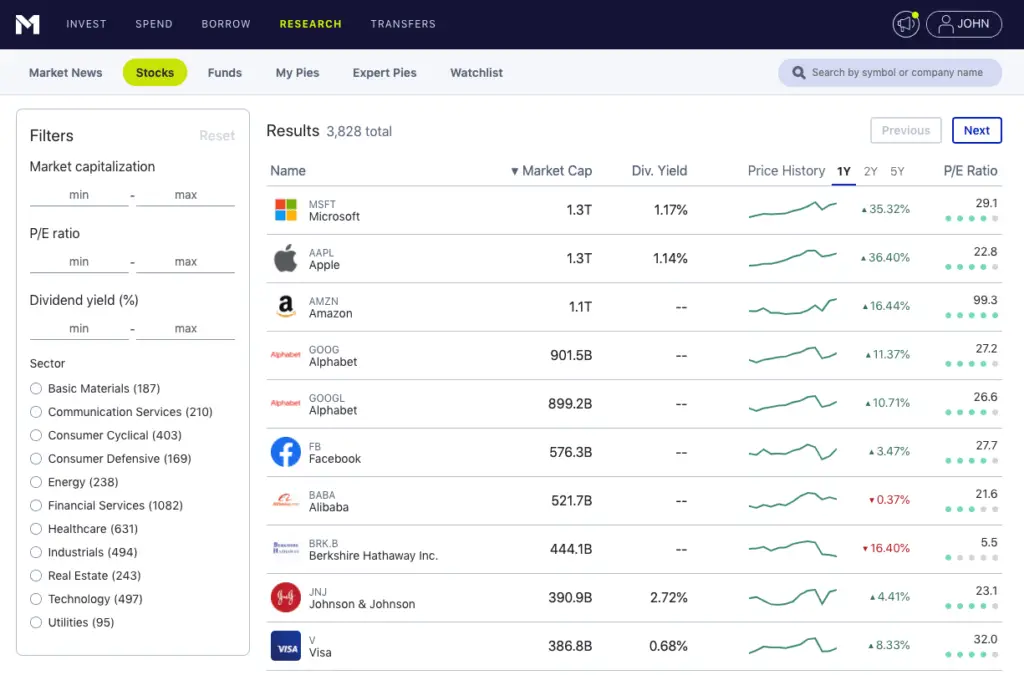
And here's Betterment:
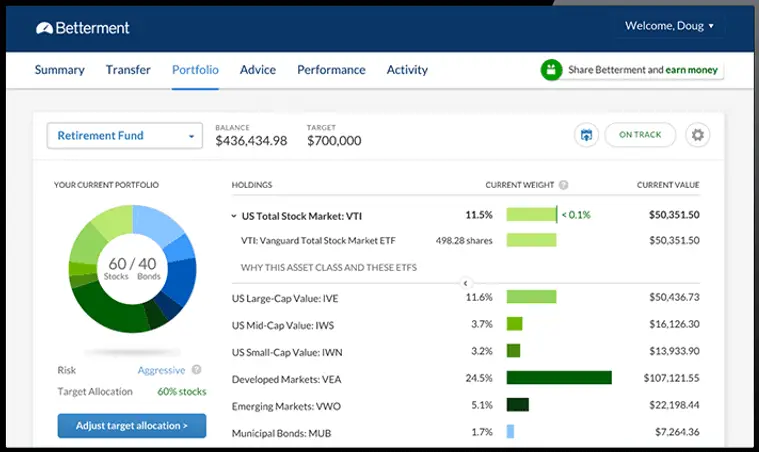
M1 Finance vs. Betterment – Extra Features
Both M1 Finance and Betterment offer FDIC-insured checking accounts, making them both suites of financial tools instead of just investing platforms. With their premium M1 Plus option, you can earn interest and cash back on M1's checking account. Betterment's checking account does not earn interest or cash back.
Neither M1 Finance nor Betterment offer robust charting and analysis tools. M1's research tools from both are pretty basic – stock and ETF screeners, technical indicators, etc. Betterment doesn't allow you to choose your own investments, so they have no research tools.
Both M1 Finance and Betterment offer “dynamic rebalancing,” using new deposits to automatically rebalance your portfolio to its target asset allocation, and fractional shares, a feature that allows every penny to work for you.
M1 Finance vs. Betterment – Summary and Conclusion
- M1 Finance and Betterment are both built for passive, long-term, buy-and-hold investing.
- M1 Finance offers free investing; plain and simple. Betterment carries a 0.25% fee for their basic plan and a 0.40% fee for their Premium plan. While they may not look like much, these fees shave off a massive amount of money from your portfolio over the long-term.
- M1 and Betterment offer all the same account types at this time.
- M1 Finance offers most ETF's and individual stocks. Betterment only offers a small collection of broad index funds. They do not offer individual stocks, and do not allow self-directed investing.
- Customer service should be comparable between the two platforms.
- Betterment does not offer margin. M1 offers some of the lowest margin rates on the market.
- M1 Finance and Betterment both have sleek, modern, intuitive, robust mobile apps for both Apple iOS and Android, as well as solid desktop user interfaces.
- Both M1 Finance and Betterment offer FDIC-insured checking accounts.
- Both M1 and Betterment employ dynamic rebalancing and fractional shares.
- Betterment offers expert financial advice. M1 offers Expert portfolios that you can invest in for free.
M1 Finance offers the aforementioned expert-built, quantitatively-analyzed and optimized “Expert Pies” that you can invest in for free and be completely hands-off. On Betterment's website, they claim that “while you could buy the same ETFs from a traditional broker or fund company, you couldn’t get them all from any one place without a fee, so you’d be paying to buy, sell, or trade the ETFs.” This is objectively untrue in this case. M1 allows you to buy the exact same ETF's commission- and fee-free, thereby avoiding those fees that drag down your portfolio's returns. You can also simply use M1 to invest in a “lazy portfolio” and have it rebalance automatically.
Moreover, Betterment makes it sound like they're actively managing your portfolio and employing some secret sauce to boost returns. They're not. Recall that they're simply investing your money in a small handful widely-available low-cost index ETF's, which I would argue you can easily do yourself anyway with M1 Finance. You can buy the exact same funds; they mostly use low-cost Vanguard and iShares ETF's. For the most part, Betterment appears to invest your money upon initial deposit and then doesn't do much after that aside from gradually adjusting your asset allocation, so I don't understand the need for the hefty ongoing annual fees.
Consequently, I don't see a good reason to choose Betterment over M1 Finance, unless for some reason you absolutely believe you can't complete the steps of setting up and investing in a portfolio on M1, or if you specifically need and want to pay for professional advice on life planning goals outside of investing. If you're purely looking for an investing platform, I would suggest that the marginally greater effort of investing with M1 Finance is more than worth the savings on fees over the long-term. Betterment also happens to be one the brokerages that M1 Finance sees transfers from most often:
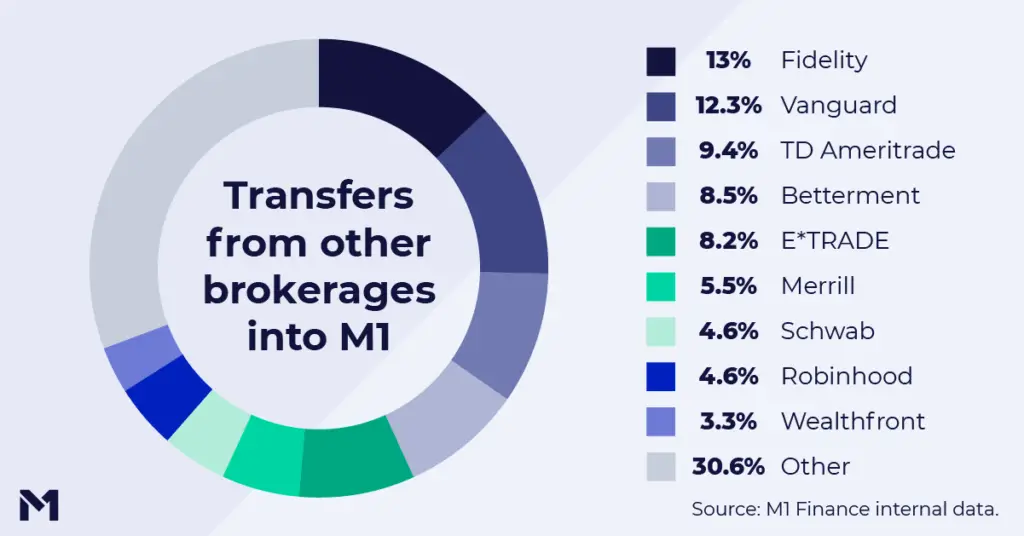
I wrote a separate comprehensive review of M1 Finance here if you're interested in seeing the nuances of the platform.
M1 currently has a promotion for up to $500 when initially funding an investment account:
Disclaimer: While I love diving into investing-related data and playing around with backtests, this is not financial advice, investing advice, or tax advice. The information on this website is for informational, educational, and entertainment purposes only. Investment products discussed (ETFs, mutual funds, etc.) are for illustrative purposes only. It is not a recommendation to buy, sell, or otherwise transact in any of the products mentioned. I always attempt to ensure the accuracy of information presented but that accuracy cannot be guaranteed. Do your own due diligence. I mention M1 Finance a lot around here. M1 does not provide investment advice, and this is not an offer or solicitation of an offer, or advice to buy or sell any security, and you are encouraged to consult your personal investment, legal, and tax advisors. All examples above are hypothetical, do not reflect any specific investments, are for informational purposes only, and should not be considered an offer to buy or sell any products. All investing involves risk, including the risk of losing the money you invest. Past performance does not guarantee future results. Opinions are my own and do not represent those of other parties mentioned. Read my lengthier disclaimer here.

Are you nearing or in retirement? Use my link here to get a free holistic financial plan from fiduciary advisors at Retirable to manage your savings, spend smarter, and navigate key decisions.
Don't want to do all this investing stuff yourself or feel overwhelmed? Check out my flat-fee-only fiduciary friends over at Advisor.com.


Thank you for this review. I started out with Betterment purely because I was brand new to investing and was worried I would screw something up. I think it was the right decision at the time because I could see how Betterment was investing my money and do my own research as to why they chose those investments. Earlier this year, I switched over to M1 Finance. I am still not totally comfortable choosing my own investments so I particularly like the Expert Pies that M1 has available. They have not too many as to overwhelm me and not to few so I feel like I have a choice. They do a good job at showing the performance of each expert pie as well as the fees. I am happy I switched over.